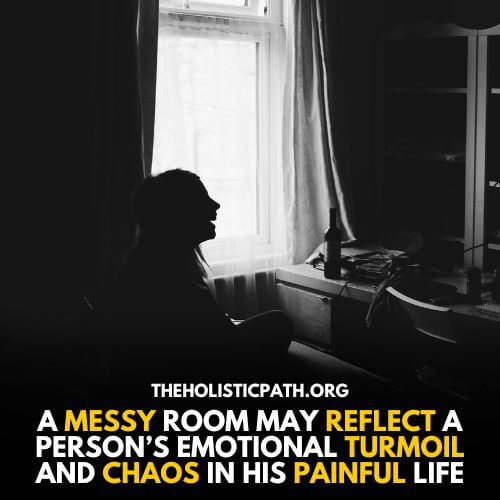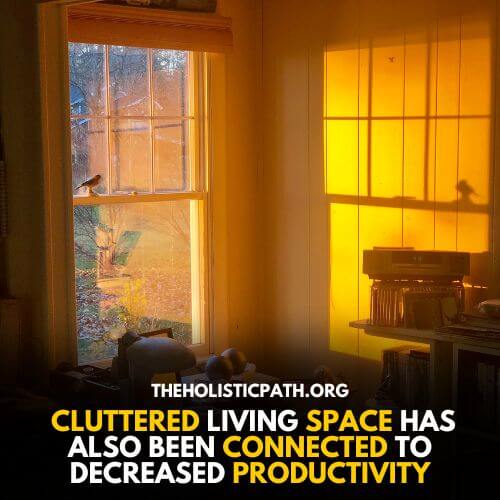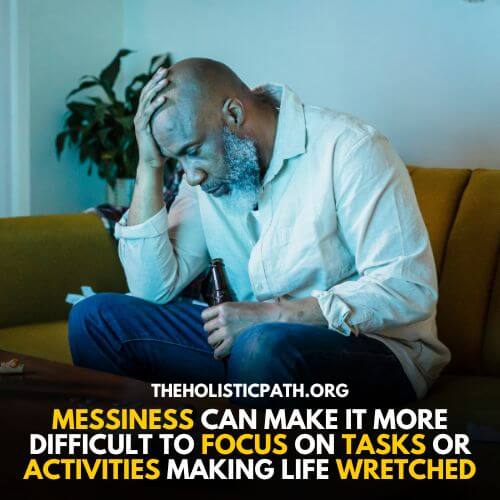When we think of depression, our minds often go to the most extreme examples and images. But in reality, depression can manifest itself in much more subtle ways–including the state of your room.
Having a messy room is not necessarily an indication of depression, but it can sometimes be a sign that something else is going on beneath the surface. In this article, we’ll explore the query ‘Is a Messy Room a sign of depression’ and find a potential connection between depression and messiness.
We’ll discuss how clutter can be an indicator of mental health issues, including depression, as well as offer tips on how to better manage both your space and your mental health.
Messy Room as a Symptom of Depression – Proven With Studies
A messy room can be an outward sign of depression, as it may reflect a person’s emotional state and inner turmoil. Studies have shown that people with depression often struggle to keep their environment organized, leading to a dishevelled living space. Even though a cluttered room does not always mean someone is depressed, it can be indicative of poor mental health and can indicate a need for more support.
Many people who suffer from depression may show a lack of motivation or interest in keeping their living spaces tidy. Having an unkempt and disorganized room can be a sign of depression, particularly when it comes to those who struggle with mental health issues. Below are some of the significant signs of depression:
- Increase in negative thoughts
- Feelings of hopelessness and helplessness
- Loss of interest in activities that used to be pleasurable
- Lack of energy or motivation
- Changes in appetite or weight
- Difficulty concentrating or making decisions
- Insomnia, early-morning awakenings or oversleeping
- Physical aches and pains that don’t respond to treatment
A study published by the Journal of Family Psychology in 2019 examined how individuals with a major depressive disorder managed their living spaces. The results of the study found that those who had depression were more likely to have messy, cluttered homes than those who did not suffer from depression.
A 2017 study published by Frontiers in Psychology studied the relationship between hoarding behaviour and self-harm or suicidal ideation. The results of the study found that people who reported higher levels of hoarding behaviour were more likely to report suicidal thoughts or self-harm behaviours.

5 Potential Causes of a Messy Room as a Sign of Depression
There are a variety of potential causes that may contribute to depression and lead to a messy room. From physical clutter to emotional or existential issues, having an untidy space can be indicative of underlying mental health struggles. Here are five possible reasons why a cluttered room might be linked to depression:
- Lack of Motivation: People with depression often have difficulty finding the motivation to complete tasks or engage in activities, including tidying up their living spaces. This lack of motivation can lead to an accumulation of clutter and messiness over time.
- Difficulty Managing Time: Depression can make it difficult for people to manage their time and prioritize tasks, including cleaning.
- Isolation: People with depression may be prone to isolating themselves from others, which can lead to a lack of motivation for taking care of their living spaces.
- Difficulty Making Decisions: Depression can make it difficult for people to make decisions or prioritize tasks, which can lead to an accumulation of clutter and messiness.
- Lack of Energy: People with depression often have difficulty finding the energy needed to keep their living spaces clean or tidy. This lack of energy can lead to a messy, disorganized room over time.
5 Things A Messy Room Mean Psychologically?
Mental health professionals often suggest that a person’s living environment can have an effect on their mental state and emotions. A messy room could be a sign of underlying psychological issues, such as depression or anxiety.
A study published by Personality and Individual Differences in 2018 found that individuals who considered themselves “neat freaks” or neat-organized had higher levels of life satisfaction and lower levels of depression than those who identified as disorganized or untidy.
A study published by the Journal of Environmental Psychology in 2020 found that people with a living space that was perceived as messier were more likely to suffer from elevated levels of depression and anxiety compared to those with tidier spaces.
Here are some potential psychological implications of a messy room:
1. Poor Self-Worth
A cluttered living space can be indicative of low self-esteem, which is often associated with depression. People who feel that they are not worthy of having a clean, organized living space may be more prone to letting clutter accumulate in their rooms.
Here are a few other related features:
- A feeling of being overwhelmed
- Lack of control in one’s life
- Fear of making decisions or taking action
- Feeling like nothing gets done correctly or to completion
2. Anxiety
A messy room has been linked to increased levels of anxiety. Those with messy rooms often feel overwhelmed and anxious about their living spaces, as well as other aspects of their lives.
Here are a few other related features:
- Feeling ashamed or embarrassed
- Having difficulty concentrating or focusing on tasks
- Loss of organization and productivity in other areas of life
- An inability to relax in an untidy space.
3. Overwhelm
The presence of clutter can make it difficult for people to focus or think clearly, which is associated with feelings of overwhelm. This can create a cycle of disorganization and messiness that can be difficult to break.
Here are a few other related features:
- Feeling like the clutter is never-ending and unmanageable
- Difficulty prioritizing tasks or making decisions
- Loss of interest in activities due to feeling overwhelmed
- Avoidance of certain spaces due to messiness.
4. Lack of Productivity
A cluttered living space has also been linked to decreased productivity. People with messy rooms may struggle to keep up with their tasks or responsibilities, leading to chaos and disorder in their daily lives.
Here are a few other related features:
- Procrastination due to feeling overwhelmed by clutter
- Inability to focus or concentrate on tasks or projects
- Feeling fatigued and drained when attempting to clean up messes
- Difficulty staying organized and getting things done.
5. Difficulty Coping
It has been suggested that people with messy rooms may have difficulty managing their emotions and coping with stress. This can lead to a buildup of clutter in their living space over time.
Here are a few other related features:
- Increased avoidance of stressful situations or triggers
- Difficulty regulating emotions and expressing feelings
- An overall lack of motivation to keep up with daily tasks or activities
- Feeling helpless or hopeless when trying to manage clutter.

What Does A Messy Room Define the Personality?
Although a messy room can be reflective of underlying psychological issues or mental health conditions, it doesn’t necessarily define the personality of an individual. Different people have different standards when it comes to tidiness, and some may prefer their living spaces to be more cluttered than others.
A study published by Personality and Social Psychology Bulletin in 2016 found that individuals who were more organized and tidy had higher levels of conscientiousness, while those who preferred a messier living space had higher levels of openness to experience.
A study published by the International Journal of Environmental Research and Public Health in 2019 found that people with messy rooms were more likely to have higher levels of psychosomatic symptoms such as headaches, fatigue, and stomach aches.
What is a Messy House Syndrome?
Messy House Syndrome, also known as hoarding disorder, is a mental health condition characterized by an excessive accumulation of objects or possessions. People with this disorder often feel an intense need to keep items that they find difficult to part with, leading to overcrowded and disorganized living spaces.
Below are a few other related characteristics:
- Hoarding disorder is associated with low self-esteem, depression, and anxiety.
- It can also cause social isolation due to embarrassment or shame over the state of one’s living space.
- People with this condition often have difficulty making decisions and organizing their thoughts.
10 Unusual Advantages of Messiness
Although tidiness can be beneficial in many ways, there are a few advantages to occasional messiness. Here are 10 advantages of messiness:
- Creativity: Being surrounded by clutter can help individuals unleash their creativity and problem-solving skills.
- Relaxation: A messy environment can be a helpful cue to take things less seriously and relax.
- Organization: Messiness can help people organize their thoughts better, as they have to carefully sort through all the objects to find what they are looking for.
- Self-exploration: A messy environment can help an individual take a step back and evaluate where they are in life.
- Positive Emotions: Clutter can evoke positive emotions associated with past experiences or sentimental items.
- Productivity: Messy environments can boost productivity since individuals are less likely to procrastinate when surrounded by objects.
- Flexibility: Messiness can lead to increased flexibility and open-mindedness in problem-solving and decision-making.
- Freedom: A cluttered environment can offer a sense of freedom from being bound by rules or expectations.
- Connection: Having meaningful items around can help people feel connected to their past.
- Self-Expression: Messiness allows individuals to express themselves in a way that they would be unable to do with a tidier environment.
10 Obvious Disadvantages of Messiness
Although there are some benefits to being messy, there are also several disadvantages that come with it. Disorganization can lead to stress and lost productivity, while too much clutter can create an overwhelming environment. Here are 10 disadvantages of messiness:
- Stress: Too much messiness can lead to increased stress levels, due to disorganization and difficulty finding what one needs.
- Lost Productivity: Messiness can lead to lost productivity since it is hard to focus on a task in such an environment.
- Inability To Relax: Too much clutter can make it harder for individuals to relax and take a break.
- Time Wasted: It can take more time to find what one is looking for in a messy environment, leading to wasted time.
- Lack of Focus: Messiness can make it more difficult to focus on tasks or activities due to feeling overwhelmed.
- Health Hazards: Clutter can create dust and mould, leading to health risks such as respiratory problems.
- Financial Issues: Messiness can lead to financial issues due to not being able to find important documents or items.
- Social Isolation: Too much mess can create a sense of embarrassment and shame, leading to social isolation.
- Decreased Self-Esteem: Seeing one’s mess can lead to decreased self-esteem or feelings of failure.
- Hoarding Disorder: In extreme cases, messiness and disorganization can lead to hoarding disorder.
With this being said, it is important to find a balance between tidiness and messiness. Everyone can benefit from some chaos in their lives, but having too much of it can be overwhelming and lead to negative consequences.

7 Tips to Deal with Mess Rooms to Avoid Depression
It can be easy to get overwhelmed and depressed when dealing with messiness in one’s home. To help combat this, here are seven tips to deal with mess rooms:
1. Set Goals
Create short-term goals to tackle the clutter step by step. This will make it easier to manage and help motivate you to stay on track. Here are a few more related tips:
- Set a specific timeline for each goal.
- Break down the goals into manageable chunks.
- Prioritize tasks and identify which items are most essential to clean up first.
- Focus on one area at a time, rather than trying to tackle everything at once.
2. Declutter
Start by discarding items that are no longer needed or used. This will help to create more open space and make it easier to stay organized. Here are a few more related tips:
- Create a donation pile for items that can be given away.
- Recycle old newspapers, magazines, and other paper materials.
- Keep only the items you love and use regularly.
3. Create a System
To maintain organization, create a system for storing items and designate specific areas for different tasks. Here are a few more related tips:
- Label all storage containers to make it easier to find what you need.
- Use baskets, boxes, and bins to organize items by category or function.
- Create an area for paperwork and mail.
4. Utilize Vertical Space
Make use of vertical space by using shelves, hooks, and other wall-mounted storage solutions. This will help to keep your items off the floor and out of sight. Here are a few more related tips:
- Install pegboards or slat walls for hanging items such as tools, sports equipment, and kitchen utensils.
- Purchase furniture with built-in storage such as ottomans or dressers with drawers.
5. Add Art and Decor
Add art and another wall decor to make the room look more inviting. This will help mask any messiness and create a sense of style in the space. Here are a few more related tips:
- Hang art prints, photographs, or wall hangings.
- Display books, candles, or sculptures to add visual interest.
6. Take Breaks
Taking breaks throughout the day can help to reduce stress and provide a mental break from the task at hand. Here are a few more related tips:
- Take short walks outside or listen to music while you clean up.
- Take a few minutes to meditate or practice some deep-breathing exercises.
7. Get Help
If the mess is too overwhelming, don’t be afraid to ask for help. Investing in professional cleaning services may be worth it if the job is too big for you to handle alone. Here are a few more related tips:
- Hire a professional organizer to help you create an effective system for organizing your belongings.
- Find a family member or friend who is willing to lend a hand in tidying up the space.
Following these tips can help those dealing with mess rooms stay motivated and organized, and avoid feeling overwhelmed or depressed. Utilizing these strategies can help create a peaceful and productive environment in your home.
Conclusion
Having a messy room can be overwhelming and lead to negative emotions such as depression. It is important to find a balance between tidiness and messiness so that everyone can benefit from some chaos in their lives without it becoming too overwhelming.
Following the seven tips outlined above can help those dealing with mess rooms stay motivated and organized, avoid feeling overwhelmed or depressed, and create a peaceful and productive environment in their home. With some dedication and the right strategies, anyone can conquer their mess rooms and make them into functional spaces they enjoy spending time.
Frequently Asked Questions
What mental illness makes you messy?
There is no single mental illness that causes people to be messy. However, disorganization and messiness can be symptomatic of various mental health conditions such as Attention Deficit Hyperactivity Disorder (ADHD), depression, anxiety, and hoarding disorder.
People with these conditions may struggle with time management or have difficulty controlling their impulses which can lead to messiness. Additionally, certain medications and substance abuse can contribute to disorganization and messiness. It is important to seek professional help if difficulty with the organization is affecting daily life activities or causing distress.
Why is my bedroom always messy?
There are many potential reasons why your bedroom may be always messy. It could be that you do not have a designated system or place for organizing items, or it could be due to a lack of motivation and/or time management.
You could also be suffering from mental health issues such as depression, anxiety, or Attention Deficit Hyperactivity Disorder (ADHD) which can lead to disorganization and messiness. Additionally, certain medications or substance abuse may also contribute to poor organization and messiness. It is important to identify the source of the problem in order to find an effective solution.
Why do I get mad when my room is messy?
It is normal to feel frustrated when your room is messy. Messy spaces can be overwhelming and lead to feelings of stress, anger and anxiety. Additionally, messiness can also be symptomatic of various mental health conditions such as Attention Deficit Hyperactivity Disorder (ADHD), depression, and anxiety.
It is important to identify the source of the mess and find an effective way to manage it in order to reduce feelings of anger and frustration. Additionally, finding a balance between tidiness and messiness is key to having a peaceful living environment. Professional help may be necessary if the messiness is causing distress or affecting daily life activities.
Is being messy a mental illness?
No, being messy is not a mental illness. However, disorganization and messiness can be symptomatic of various mental health conditions such as Attention Deficit Hyperactivity Disorder (ADHD), depression, anxiety and hoarding disorder.
People with these conditions may struggle with time management or have difficulty controlling their impulses which can lead to messiness. Additionally, certain medications and substance abuse can contribute to disorganization and messiness. It is important to seek professional help if difficulty with the organization is affecting daily life activities or causing distress.
References:
Psychecentral ( May 6, 2022). The Link Between Messy Rooms and Depression. https://psychcentral.com/depression/messy-room-depression
